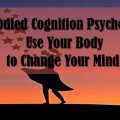Certainly, you’ve heard the advice “Fake it til You Make It”.
If you want to be rich, act like a rich person every day. Do what rich people do.
If better fitness or health is your goal, see yourself as a fit and healthy person. Do what fit and healthy people do.
Does acting “as if” make any difference, though?
A 2019 study published in Royal Society Open Science used fMRI scans to find that acting physically changes brain activity.
About the Study
Actors behave, respond, and think from the perspective of a fictional first-person perspective. They behave and think as if they were someone they’re not.
In this study, 15 actors were asked hypothetical questions, and they responded from different perspectives.
Questions included:
-
Would you go to a party you were not invited to?
-
Would you tell your parents if you fell in love?
-
Would you do/be…?
Each task and fMRI scan consisted of nine randomly ordered questions, covering topics that included friendship, parents, religion, romance, authority, social status, conflict and death
The actors answered in first-person (answering as themselves) and in third-person (as the character Romeo in Romeo and Juliet and also as Juliet). They also responded as themselves, but in a British accent. They also answered questions from the perspective of some close ‘other’ who they knew well, using the pronoun ‘he’ or ‘she’.
The fMRI scan results showed that acting led to deactivations in brain areas involved in self-processing. Even when the actors answered as themselves, but just used a British accent, the self-processing regions of their brains showed deactivation.
The results also lend credence to the theory of embodied cognition, where a change in gestures, movement, or behavior can influence the way that people think and the emotions that they feel.
You can read more about Embodied Cognition here.
Acting “As If” in Everyday Life
It is easier to act yourself into a new way of thinking, than it is to think yourself into a new way of acting.~Millard Fuller
To a certain degree, everyone acts. We act a certain way on social media. We act another way with colleagues at work. We act differently with different people and in different environments.
But acting “As If” when you want to change yourself and improve in some way is especially useful.
This study demonstrated that thinking from a different perspective, or acting “As If” creates real, physical changes in our brains.
Acting doesn’t just suppress your sense of self or your self-processing, it also activates parts of the self that usually aren’t used or accessible.
Acting “As If” can be extremely useful when you’re trying to change or improve yourself in some way.
Playing the role of actually being your future self – the one who has already reached your goal – has real and measurable physical effects. It also enhances the behaviors that make achieving your goal much more likely.
REFERENCES
Steven, B., Cockett, P., & Yuan, Y. (2019, March 13). The neuroscience of Romeo and Juliet: An fmri study of acting. https://royalsocietypublishing.org/doi/10.1098/rsos.181908





